New study determines that Catalonia’s anchovies are healthy and free of the parasite Anisakis

A study conducted by the research group SEAaq (Ecosystem and Aquatic Animal Health) of the Department of Animal Biology, Plant Biology and Ecology at the Universitat Autònoma de Barcelona (UAB) and published in the journal Science of The Total Environment has focused on the analysis of the state of health of anchovies found in different points of the Catalan coast (Tarragona, Barcelona and Blanes).
Among the several aspects analyzed, scientists focused on the parasites infecting this species, with particular interest put on the species that could be transmitted to humans and cause possible infections (zoonotic parasites). They also analyzed the presence of anthropogenic elements (including microplastics) in the digestive tracts of the fish, as well as the potential impact these plastics could have on their states of health. Additionally, they compared the values obtained with those collected 12 years before.
According to the results of the study, anchovies caught off the Catalan coast did not present any relevant pathologies, nor did they contain any zoonotic parasites that could affect human health. According to UAB researcher Oriol Rodríguez-Romeu, “Although the fish we analyzed did contain parasites and other minor alterations in their organs, it was all within the normal levels we would find in the natural environment. None of this poses a threat, neither for the anchovy nor for humans.”
In comparison to anchovy populations found in other areas of species distribution, where scientists did register elevated levels of zoonotic parasites, the anchovies of Catalonia’s coast seem to have a greatly reduced risk of transmitting these parasites to humans. “For example, the parasite Anisakis was not detected in any of the individuals of the different populations studied, in contrast to what occurs in the Atlantic or other areas of the Mediterranean, where there is a more frequent presence of this parasite,” highlights UAB researcher Maria Constenla.
Anchovies (Engraulis encrasicolus) are a key component of the Mediterranean’s pelagian ecosystems, with a notable commercial value for many of Catalonia’s coastal fisheries. In the past few decades, a progressive reduction in the size of anchovy populations has been observed in the Mediterranean, as well as in their size and age of maturation. Although the study did not reveal the effects of plastics on Catalan anchovies, it is worth highlighting that the levels of plastic pollution (microplastic ingested) in fish is more elevated in the samples collected in 2019 (70% prevalence) than 12 years before, in 2007 (with a 40% prevalence). Once again, this is a clear reminder of the need to fight plastic pollution and prevent it from reaching the environment.
In this study, scientists found microfibers and plastic particles in the digestive tracts of approximately half of all fish analyzed, and between one and two items per anchovy. These levels are relatively similar to or even lower than what can be found in species from the same area and reflect, as the scientific community has demonstrated, the abundant presence of plastic-derived particles in the marine environment.
Nevertheless, these studies also conclude that there seem to be no direct effects on the health of the fish. The fact that the particles are only found in the digestive tract is also an important fact with regard to food safety, given that before anchovies can be eaten, as occurs with the majority of fish species, all entrails are removed. Therefore, “we firmly believe that the amount of microplastics susceptible of being ingested by humans as a consequence of eating anchovies is much lower that what could be consumed through any other source, such as the air or from plastic containers,” states UAB lecturer Anna Soler-Membrives.
Natural antiparasitic processes hinder anisakis infection in fish
Oriol Rodríguez-Romeu et al, Assessment of the health status of the European anchovy (Engraulis encrasicolus) in the NW Mediterranean Sea from an interdisciplinary approach and implications for food safety, Science of The Total Environment (2022). DOI: 10.1016/j.scitotenv.2022.156539
Citation:
New study determines that Catalonia’s anchovies are healthy and free of the parasite Anisakis (2022, June 14)
retrieved 15 June 2022
from https://phys.org/news/2022-06-catalonia-anchovies-healthy-free-parasite.html
This document is subject to copyright. Apart from any fair dealing for the purpose of private study or research, no
part may be reproduced without the written permission. The content is provided for information purposes only.
For all the latest Science News Click Here
For the latest news and updates, follow us on Google News.

